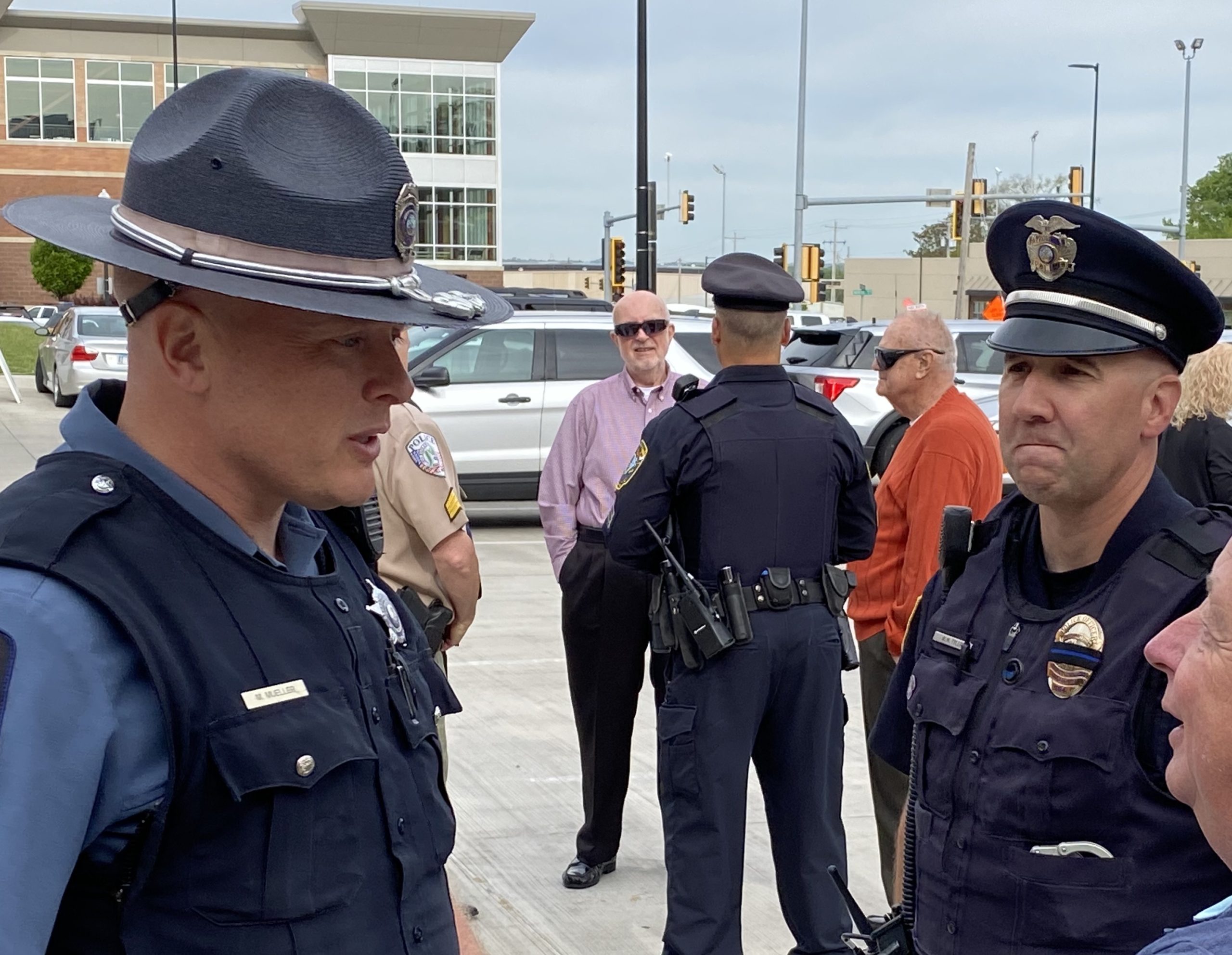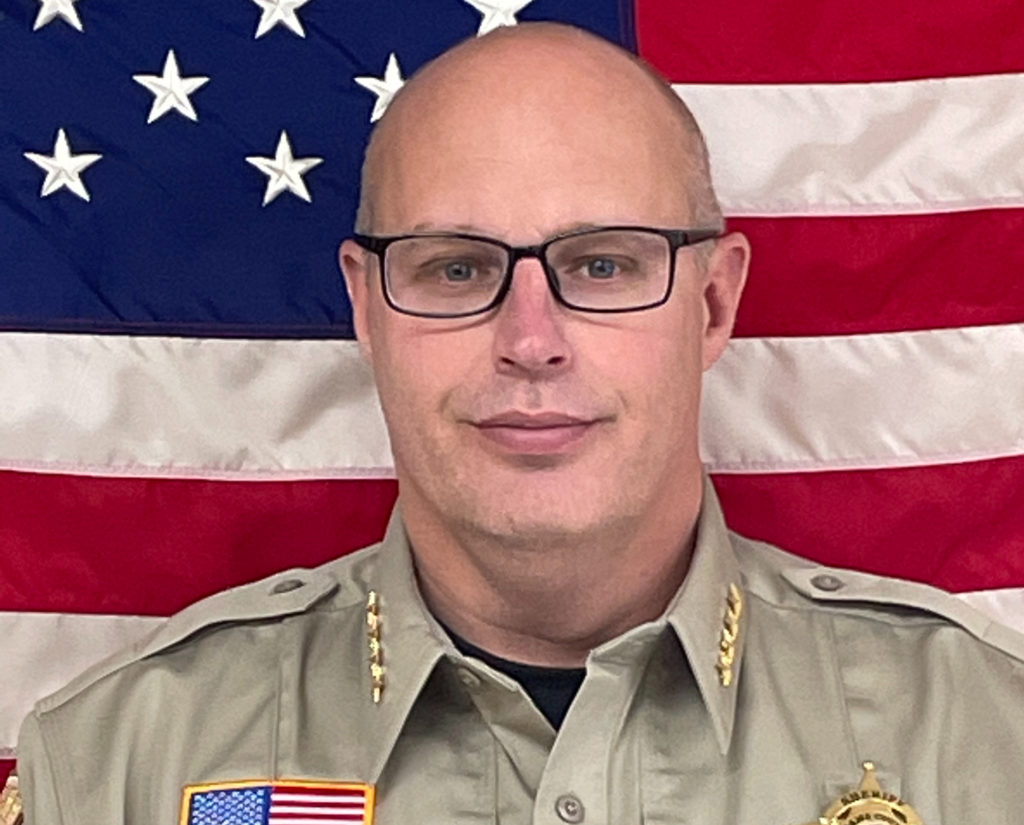Lack of respect, concerns with criminal reform bill make finding local law enforcement officers difficult

QUINCY — The allure of becoming a police officer isn’t what it once was.
The National Police Foundation reported in 2020 that 86 percent of police departments nationwide are experiencing a shortage of officers. Hiring for officers is on a five-year decline.
Quincy and Adams County are not immune to this problem.
Figures provided by the Quincy Police Department show only 20 people applied for a job as a police officer in 2020. The number of applicants has been below 40 for the past five years.
“When I started in 1980, you had hundreds of people who would test for a department our size, and on average, we were filling probably three or four positions,” Chief Rob Copley said. “When I became chief in 2004, we were getting between 60 and 70 applicants. It has steadily decreased. This past year … it was pretty dismal.”
Copley said the department has 69 officers today, and the budget calls for 73. He has yet to fill open positions because recent COVID restrictions have limited necessary training for officers.
The shortage of candidates also exists in the Adams County Sheriff’s Department. Sheriff Rich Wagner said only 15 applicants were certified for a patrol deputy position in 2019. Only nine applicants have been received in 2021. The department did not test for new deputies in 2020.
Wagner said his department has 27 deputies, 36 corrections officers and 10 court security officers.
The starting salary for a police officer in Quincy is $55,600. The starting salary for a deputy in Adams County is $48,672.

“When I started in 1980, you had hundreds of people who would test for a department our size, and on average, we were filling probably three or four positions. When I became chief in 2004, we were getting between 60 and 70 applicants. It has steadily decreased. This past year … it was pretty dismal.”
— Rob Copley, Quincy Police Chief
Confidence in police dropping
As the number of applicants decreases, both Copley and Wagner are concerned the number of people who stay in law enforcement will decrease as well. They see two reasons contributing to that trend.
Civil unrest nationwide has led to protesters demonstrating against police brutality. A December 2020 Gallup poll showed Americans’ confidence in the police has dropped to a record low of 48 percent — the first time in 27 years that it was below 50 percent.
“It’s not the local attitude. We have a great community,” Copley said. “Nationwide, there’s a terrible lack of respect for police at all levels.”
“Our officers do not get the respect that they did 10 years ago, or even five years ago,” Wagner said. “They have broad shoulders, and they know they have a job to do, and they need to do it professionally. Now, 99.99 percent of this community appreciates law enforcement. I strongly believe that. I think they respect us. They think we do a good job. But there is a small percentage out there who just do not really like the police, and that’s disappointing because we’re there for them. Our job is to serve them to help them when they’re in need, when they’re having the worst day of their life.”
Both men also believe officers in Illinois are planning to leave the profession because of the criminal justice reform bill signed into law in February by Gov. J.B. Pritzker. The Illinois Law Enforcement Coalition — a group formed by several police unions — suggested that the bill would lead police officers to quit. Ed Wojcicki, director of the Illinois Association of Police Chiefs, told a Chicago TV station he believes the bill unfairly targets officers and attempts to punish them, not just make them accountable.
“There’s a new bill coming out every day that really is hurting that desire to be a police officer,” Copley said. “We’re not seeing them leave in droves, because Quincy is a good community. But we have officers waiting to see what comes, and you know, maybe they start to look for greener pastures.”
He thought the outlawing of chokeholds was one of the positive pieces of the criminal justice reform bill. Copley, who will complete his 41st year in August, says chokeholds haven’t been used in Quincy since he joined the department.
“Making that a statewide mandate is good, because there are departments still using them,” Copley said.
The reform bill also requires all police officers to use body cameras by 2025. Police officers in Quincy have worn body cameras since 2018, and Copley believes they are effective. However, he believes some departments can’t afford to buy the cameras and may have to reduce the number of officers to do so.
“It’s great evidence for criminal cases,” he said. “It will either exonerate the officer or prove that he did what he was accused of. By and large, our experience has been that (the cameras) protect officers.”
The Adams County Sheriff’s Department does not use body cameras, but a recent survey indicated 70 percent of the staff is in favor of using them, Wagner said.

“So many people think we’re after them. We’ve got ulterior motives. We’re not there to help them. But we really are (there to help). We’re not racist. We’re not those type of people. We don’t care who you are in this community. We’re going to come help you.”
— Rich Wagner, Adams County Sheriff
Concerns about qualified immunity, force restrictions
Wagner said law enforcement officials are concerned with the reform bill’s review of qualified immunity, established by the Supreme Court in 1967. It protects state and local officials, including police officers, from personal liability unless they are determined to have violated what the court defines as an individual’s “clearly established statutory or constitutional rights.” It can be used only in civil cases, not criminal, and allows victims to sue officials for damages only under those circumstances.
He also is concerned about a section in the bill about use of force restrictions, amending when an officer can use force or deadly force and requires officers in some situations not to pursue a fleeing offender.
Wagner believes clarification of some of the language in the reform bill will help. He also says changing the public’s perception of law enforcement will help get more people interested in joining the profession.
“So many people think we’re after them. We’ve got ulterior motives. We’re not there to help them,” he said. “But we really are (there to help). We’re not racist. We’re not those type of people. We don’t care who you are in this community. We’re going to come help you. We just need to get that instilled in some minds that may be mixed up a little bit. Social media is not putting a very good light on law enforcement right now, and it’s all because of a few bad incidents that have happened in the world.”
‘Wow, we’re still doing this’
George Floyd’s death in Minneapolis and the shooting of Breonna Taylor shooting in Louisville have sparked public outrage across the nation. Copley and Wagner cringe when they learn about incidents like those.
“I’m not going to be specific to any case, but in some cases, it’s like, ‘Wow, we’re still doing this. This could have been and should have been avoided,’” Copley said. “And there are cases when I believe the officer acted appropriately and had a bad outcome but did the best that he could.”
“When I hear about stuff like this, the next morning, I come into my office, I look at our policy procedure, I talk to my two chief deputies and say, ‘Hey, what can we do to prevent this from happening here?’” Wagner said. “What can we do to make sure officers aren’t put in a situation? And if they are, what can we do to make sure they do the right thing? We get with our training officers, and we try to develop a training strategy to prevent this from happening here.”
Copley says finding future officers at job fairs is not as effective of a tool as it once was. He also would like to see more of what he called “community policing,” when an officer patrols the same area for a period of time and develops relationships with citizens to identify and solve problems.
He also believes law enforcement still is a worthwhile occupation for a potential employee.
“The job is helping people in one way or another,” he said. “When you’re arresting someone, you are helping someone. You are helping the victim. You are potentially changing the arrestee’s life. You’re making the community more safe, depending on the incident you’re arresting them for. Every day, you have the ability to positively influence lives.
“Instead of getting on Facebook and criticizing us, learn about what is happening and learn about what we’re doing. If necessary, criticize in a positive manner. If you think something needs to be changed, that’s how you become part of the change.”
“We need people to know that Adams County and Quincy Police are both professional law enforcement agencies, and you can have a great, awesome career with either one of us,” Wagner said. “We want people to come and apply and work here. Unfortunately, the numbers are down.”
Miss Clipping Out Stories to Save for Later?
Click the Purchase Story button below to order a print of this story. We will print it for you on matte photo paper to keep forever.

